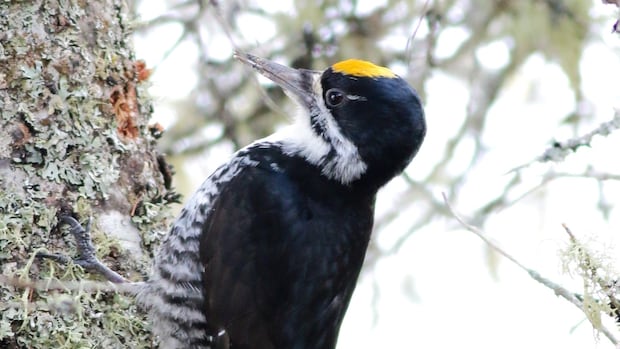As wildfires tear through New Brunswick’s forests at record rates this year, researchers say the resulting damage is reshaping bird habitats — displacing some species while creating new opportunities for others.
“With every disturbance in a forest, you have winners and losers,” says Joe Nocera, a forestry and environmental management professor at the University of New Brunswick.
In this case, the winners will be woodpeckers.
“These birds move in because there’s a bunch of standing deadwood that, as it decays, becomes colonized by all of these wood-boring insects, and they feast upon these,” said Amy-Lee Kouwenberg, an associate director at Birds Canada.
Wildfires, while destructive, are a natural part of forest ecosystems, Kouwenberg explained. They clear out underbrush and create habitats that support a wider range of species, boosting biodiversity in the long run.
Woodpeckers thrive in burned areas, and the resulting tree cavities they leave behind are used as nesting sites that other birds — like chickadees, bluebirds and nuthatches — rely on.
One species in particular — the black-backed woodpecker — has become a “poster child” for birds who thrive in burned forests, Kouwenberg said. Although this species has had historically low populations because of its preference for burned forests, it isn’t considered at risk.
Nocera said wildfires are generally good for birds who eat wood-boring insects or need more open areas. But while open spaces and burned trees benefit some species, others suffer from fire-related habitat loss.
Species like the Canada warbler, wood thrush and Bicknell’s thrush — all of which depend on dense, mature or shrubby forests — are particularly vulnerable .
“Some birds may die, especially if the fire happens when birds are on the nest and the eggs or chicks can’t escape,” said Karen Hodges, a conservation ecologist and a biology professor at the University of British Columbia.
Despite widespread damage from this summer’s wildfires, researchers say some species will still benefit in the aftermath.
“Birds may have trouble foraging. They also hate breathing smoke, so it can be really damaging for them in terms of flying. It can affect migration,” she said.
“The estimate is that there are several thousand species that are threatened with extinction because of these changes in fire and the increase in these massive fires,” she said.
Prescribed fires as a mitigating measure
To reduce the risk of wildfires, Hodges says prescribed burning — the practice of setting small, controlled fires — can help return wildfire activity to a more natural level.
“What we’ve done over the last century and a half is not allow a lot of fires to burn,” Hodges said. “So we’ve made it easier that if a fire starts … it can burn a large area because it’s hot, it’s dry and there’s abundant fuel to burn.”
Hodges said small, controlled fires reduce the available dead, dry vegetation, which becomes fuel that allows wildfires to spread so quickly.
According to the Canadian Interagency Forest Fire Centre (CIFFC), a fire management corporation, there have been 23 prescribed fires recorded this year in Canada as of Sept 4, including two still active fires by Parks Canada. This year, prescribed fires have burned almost 1,800 hectares.
Record-breaking season
Historically, the Acadian forest, which stretches across the Maritimes, has experienced small, low-intensity fires that helped make it “fire resistant,” Nocera said. In the past, these fires burned surface vegetation and helped regenerate forests.
But lately, Nocera said wildfires are becoming more destructive because many are also burning the canopy.
Wildfires that burn both the ground level and the canopy, Nocera says, make it harder for forests to regenerate.

Hodges said fires these days are hotter, more destructive and spread faster than in the past.
According to the CIFFC, New Brunswick has already recorded more than 300 wildfires this year, burning more than 2,500 hectares.
That’s a 1,239 per cent increase compared to last year in total hectares burned.








